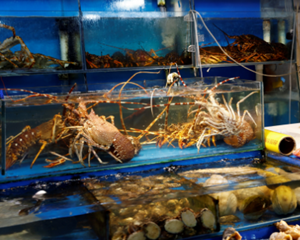China has retaliated against Japan as it had promised to do, slapping a blanket ban on Japanese seafood imports.
按照之前所承诺的,中国于日前对日本展开了回击,全面禁止从日本进口的海产品。
It fears contamination from treated radioactive water, which Tokyo began releasing from the wrecked Fukushima nuclear plant.
中方担心,从受损的福岛核电站排放出来的处理过的放射性水,会造成污染。
Last-ditch appeals by activists and by the Chinese government failed to halt the discharge,
活动人士和中国政府最后的呼吁,都未能阻止日方的排放污水行为,
which was given the all clear by the International Atomic Energy Agency.
这是由于国际原子能机构此前对排放进行了全面检查。
Chinese customs suspended imports from Japan of all aquatic products.
中国海关已宣布暂停从日本进口所有水产品。
China was the biggest buyer of Japanese seafood last year, importing about $600 million worth of produce.
去年,中国是日本海产品的最大买家,进口了价值约6亿美元的产品。

And Chinese territories Hong Kong and Macau also announced bans covering Japanese seafood imports from 10 regions.
中国香港和中国澳门也宣布禁止从10个地区进口日本海鲜。
Meanwhile, protests as well in South Korea, police arrested at least 14 people who stormed a building housing a Japanese embassy in Seoul.
与此同时,在韩国也发生了抗议活动,警方逮捕了至少14名袭击日本驻首尔大使馆大楼的人。
South Korea is maintaining import bands of Fukushima fisheries and food products until public concerns are eased.
韩国将维持有关福岛渔业和食品产品的进口限制,直到公众的担忧得到缓解。
North Korea also denouncing the water release, demanding that Japan immediately call off the discharge.
朝鲜也对日本排放污水进行了谴责,要求日本立即停止该行为。
Pyongyang described the move as a "unforgivable crime against humanity", for which Tokyo will be held accountable.
平壤方面称此举是“不可饶恕的反人类罪行”,日本将为此负责。



